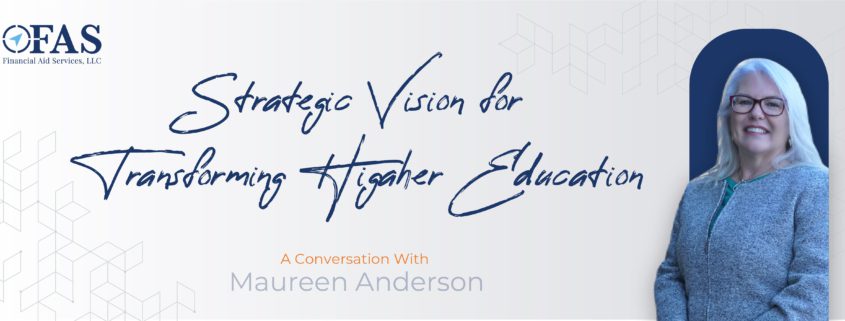Accomplished Leader in Financial Aid, Maureen Anderson, on being appointed VP of Consulting Services at Financial Aid Services, LLC.
CEO of FAS, Robert Heil sat down with newly appointed Vice President of Consulting Services, Maureen Anderson, to discuss her vision and perspective on the most pressing issues facing financial aid and student business services.
Maureen Anderson, FAAC®, brings over 25 years of expertise in student financial aid, spanning diverse institutions such as two-year, four-year public and private institutions. Maureen also served as FASFAA Vice President of Training and was previously an instructor for SASFAA New Aid Officer Training, NASFAA Credentials, and the United States Department of Education Decentralized Training. Since joining FAS in 2021 as a consultant, Maureen supported countless institutions with compliance reviews and consulting. She was named the new Vice President of FAS Consulting Services in January 2024.
Maureen, FAS is excited to welcome you as our new VP of Consulting Services! Could you share a brief backstory and how you began your journey in higher education?
I began my journey in student financial aid over 30 years ago, navigating through various educational institutions. I started at a public technical college, moved to a private graduate school, and landed at a community college. I attended a community college and genuinely value its mission of providing access to all. I feel strongly about helping underserved students and being a voice for those who may not have a voice.
What led you to choose a career in financial aid?
Like many in financial aid, I landed in this role by accident. I worked at an institution with three financial aid administrators in two years. I had a reputation for tenacity and perseverance, and I was asked to fill the role. My boss saw more in me than I saw in myself, so I trusted him and took a leap of faith. We had an unannounced program review in my first six months in the position. One of the sanctions was to verify every file for two years. As you can imagine, I had to learn financial aid fast. I took the 1500-page Student Aid Handbook home every night and began studying. As the saying goes, the rest is history.
What led me to stay in financial aid and fall in love with the profession was the challenge and the opportunity to make a tangible impact on student’s lives by facilitating their access to education. Witnessing the transformative power of education firsthand fueled my commitment to this field.
I’ve remained dedicated to professional development and mentoring others during my professional journey. I often think of my mentors throughout my career. I was fortunate to have many people who shared their knowledge and experience along the way. Because of this, I’m passionate about mentoring new financial aid administrators. My commitment to continuously learning and staying relevant in the industry and assisting others is reflected in my new role at FAS.
Let’s dive into the heart of financial aid. Maureen, from your perspective, what do you see as the most pressing issue in financial aid today?
The most pressing issue in financial aid today is navigating the challenges arising from the constantly changing landscape of higher education. We are witnessing a significant decline in enrollment, making it imperative for financial aid offices to reassess and adapt their strategies to meet evolving student expectations.
Technological advancement, staying technologically savvy being adept, and staying on the cusp of evolution is a necessity. The need to embrace innovative solutions is crucial for providing students and their families with efficient and user-friendly financial aid processes. Simultaneously, remaining compliant with regulatory changes cannot be overstated, as the financial aid landscape is continually shaped by evolving policies and requirements.
Financial aid offices are grappling with a retention and staffing crisis, which further complicates the ability to deliver effective services. The shortage of skilled professionals poses a challenge to maintaining the high standards of support that students require. These are mission-critical challenges in financial aid today. Navigating these complexities requires a strategic and adaptable approach to ensure that financial aid offices continue to serve students effectively in an ever-changing educational landscape.
Maureen, in your perspective, what gaps do you see in most financial aid offices?
The industry is progressing towards more tech-enabled solutions and that is the gap I most commonly see. Embracing advanced technologies such as artificial intelligence and analytics will enhance the user experience during the financial aid process. There are knowledge gaps that need to be carefully considered too. Institutions face challenges in implementing new processes while maintaining compatibility with their current infrastructure. Bridging this gap is crucial to realizing the full potential of technological advancements in financial aid.
I’ve heard you talk about this technology optimization gap with our consultants. How are you planning to help clients address this gap?
First, we can conduct a thorough assessment of their current systems and identify areas for opportunity. Then, we develop tailored strategies to help our clients optimize their current technologies. Our consultants bring a unique combination of deep subject matter expertise around financial aid and compliance combined with a tech-savvy background. It’s a unique combination you don’t see at other consulting firms. That unique combination helps our clients leverage technology opportunities quickly that make a significant impact on their staff and on the student experience.
Maureen, acknowledging that our industry is facing the most significant changes we’ve experienced in decades, how can a campus leader strategically plan for the future when there seems to be so much uncertainty?
Planning for the future of federal student financial aid involves forecasting, staying informed, and building connections. Keeping an eye on policy changes, attending and being a presence at conferences, and networking with peers. I believe in having a contingency plan for different scenarios and building adaptability into processes. Invest in technology to streamline operations, diversify funding sources for stability, and advocate for positive changes. Prioritize team training for a proactive and resilient approach. It’s about staying strategic, connected, and ready to pivot as needed.
Could you highlight the 1 or 2 of most pressing challenges you see in the industry? What considerations should institutions keep in mind to proactively address or avoid these challenges?
FAFSA Simplification and 2024-25 changes are prevalent. But I think more concerning and more detrimental are the staffing shortages and the difficulty institutions have keeping experienced financial aid professionals. There are a variety and number of reasons why financial aid professionals are leaving their current roles or leaving the profession entirely. An effective financial aid professional requires a very unique skillset and generally, institutions are unaware of the complexities and stress the office and staff feel. Burnout is a significant concern.
As a leader, what values do you hold dear in your professional life?
Honesty and integrity are my core values. I once met Steve Spurrier (former NCAA and NFL football coach) and he gave me a list of his leadership principles and quotes. One of his quotes is, “I don’t think telling the truth ever gets anyone in trouble in the long run. Maybe the day after, but not in the long run.” Of course, we have to balance honesty with kindness, but with the important things in life, honesty is the best policy.
To close, is there a quote that changed your life or that you live by?
In financial aid, the quote I said every single day, sometimes multiple times a day, is, “Grant me the serenity to accept the things I cannot change, the courage to change the things I can, and the wisdom to know the difference.” In dealing with people, I think of Maya Angelou’s words: “People will forget what you said, people will forget what you did, but people will never forget how you made them feel.” And for supervision and leadership, I remember the words of one of my mentors, “my job is to make [my employees] successful.” Those words and quotes have run through my head throughout my career.
About FAS:
Financial Aid Services (FAS) has been a trusted partner in higher education for over 30 years, offering a range of services to enhance operational efficiency, student satisfaction, and regulatory compliance in financial aid and student business services. With a seasoned team boasting an average of 28 years of experience, FAS has successfully served over 1,800 institutions nationwide and has over 1,600 years of combined industry experience.
Are you facing challenges at your institution?
Contact FAS today for a quick consultation on how we can help you discover solutions tailored to your unique needs. Reach out at 770.988.9447 or via email at info@FinancialAidServices.org. We look forward to connecting with institutions ready to overcome challenges and elevate their financial aid and student business services.


